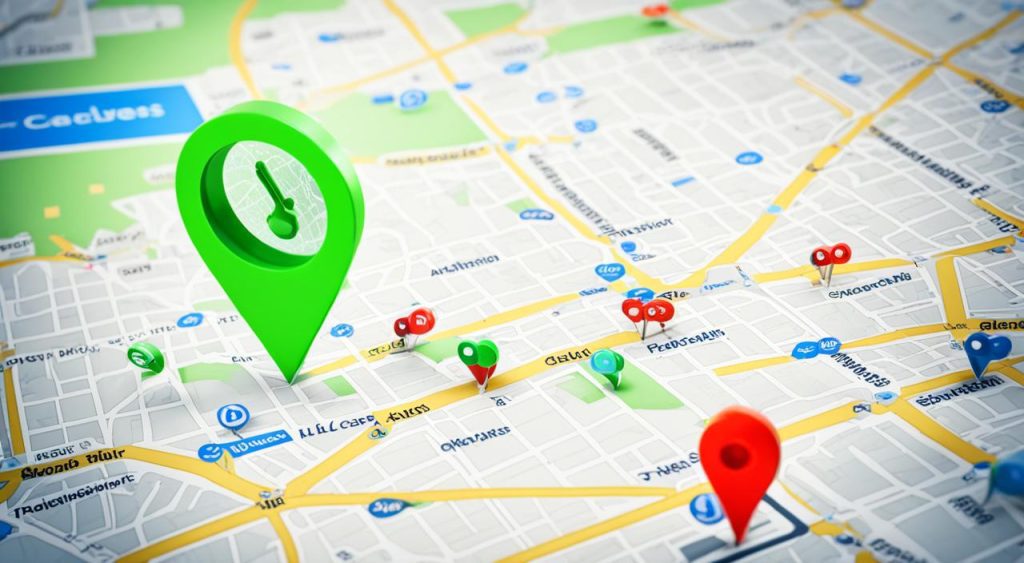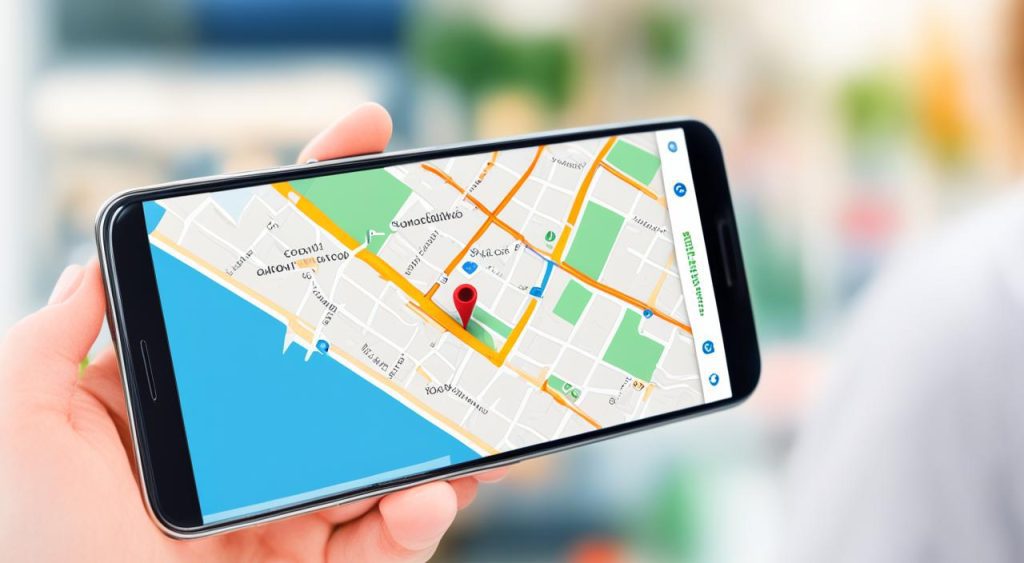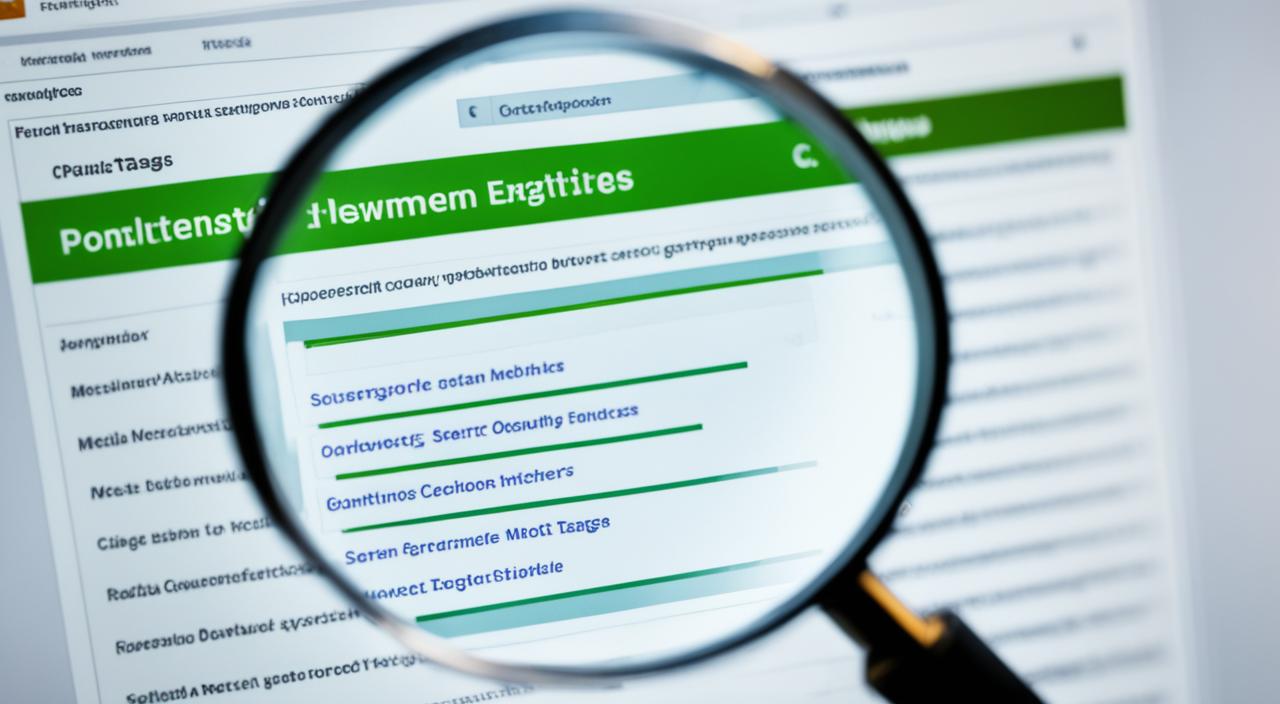
Local Listings and SEO: Maximizing Visibility Beyond Your Website
Did you know that 46% of all Google searches have local intent?
Local SEO has become an indispensable marketing strategy for businesses targeting local customers. With nearly half of all Google searches focused on local results, it’s crucial to optimize your online presence to appear in those searches and make it easier for potential customers to find you.
But what exactly is local SEO, and how can you improve your local search rankings? In this article, we will explore the key elements of local SEO, including optimizing your Google My Business listing, managing local citations, and encouraging customer reviews. By implementing the right strategies, businesses can effectively harness local SEO to maximize visibility beyond their website and connect with the local community.
Key Takeaways:
- Local SEO is crucial for businesses targeting local customers.
- 46% of all Google searches have local intent.
- Optimizing your online presence is key to appearing in local search results.
- Key elements of local SEO include optimizing Google My Business, managing citations, and encouraging reviews.
- Effective local SEO strategies can maximize visibility beyond your website.
Understanding Your Local SEO Starting Point
Embarking on a local SEO journey requires a deep understanding of your digital and local marketplace landscape. By gaining insights into the local market, analyzing competitors’ online presence, and selecting the right local keywords, you can tailor your strategies effectively and improve your local search rankings.
An essential aspect of understanding your local SEO starting point is conducting a comprehensive local market analysis. This analysis provides a clear picture of the local market dynamics, including target demographics, consumer behavior, and competitor landscape.
“Understanding the digital and local marketplace landscape is crucial in formulating an effective local SEO strategy. By analyzing the competition and identifying gaps in the market, businesses can position themselves strategically and optimize their online presence for better visibility.”
One invaluable tool in this process is AI-driven analytics, which can provide a granular view of the local market. These analytics reveal key insights into consumer search patterns, top-performing keywords, and competitor strategies. Armed with this data, businesses can make informed decisions and refine their local SEO strategy accordingly.
Keyword selection plays a vital role in local SEO. By identifying and targeting the most relevant and high-value local keywords, businesses can optimize their website content, meta tags, and online directories for better search visibility. Local keyword research tools can prove invaluable in this process, helping businesses uncover untapped opportunities for attracting local customers.

In conclusion, understanding your local SEO starting point is crucial for devising effective strategies to improve your local search rankings. Through thorough analysis of the digital and local marketplace landscape, competitive analysis, and keyword selection, businesses can position themselves for success in the local market.
Enhancing Your Website for Local SEO
Optimizing your website for local SEO is crucial to improve your visibility in local search results and effectively connect with your target audience. By implementing the following strategies, you can enhance your website’s performance and maximize its impact on local search rankings.
1. Technical SEO
Technical SEO involves optimizing your website’s backend to ensure search engines can easily understand and rank your content. Focus on key technical elements such as meta tags, heading tags, alt attributes, and XML sitemaps. Implementing structured data markup can also help search engines better understand your local business information.
2. Locally Relevant Content Creation
Create content that speaks directly to your local community and addresses their specific needs and interests. Consider incorporating local keywords naturally within your content to improve relevancy. By providing valuable and informative content tailored to your local audience, you can attract and engage users, ultimately boosting your local search rankings.
3. Mobile Optimization
Mobile optimization is essential for local SEO, as an increasing number of users are accessing the internet through their mobile devices. Ensure that your website is responsive and mobile-friendly, providing a seamless browsing experience for mobile users. Focus on optimizing page load speed, improving navigation, and designing user-friendly mobile interfaces.
4. User Experience (UX)
Delivering a positive user experience is crucial for local SEO. Make your website easy to navigate, providing intuitive menus and clear calls-to-action. Optimize your website’s design, layout, and overall aesthetics to create a visually appealing and engaging experience for users. Prioritize accessibility, ensuring your website is easily accessible for users with disabilities.

“By enhancing your website through technical SEO, crafting locally relevant content, optimizing for mobile users, and providing a seamless user experience, you can significantly improve your local search rankings and effectively engage with your local audience.”
Implementing these strategies will not only improve your local SEO presence but also enhance the overall user experience on your website. By aligning your website’s optimization efforts with the unique needs and preferences of your local audience, you can increase your visibility in local search results and ultimately drive more organic traffic to your business.
Boosting Visibility Through Local Listings and Reviews
Local listings and customer reviews play a pivotal role in enhancing local SEO, increasing your visibility and connecting with local customers. By optimizing your Google My Business profile, you can act as a direct conduit to reach and attract local customers.
“Optimizing your Google My Business profile is essential for local SEO success. It allows you to provide accurate information about your business, including address, contact details, and opening hours. Potential customers can easily find and engage with your business from local searches.”
Additionally, actively managing customer reviews is crucial for building a solid reputation and credibility. Positive reviews not only influence potential customers but also signal to search engines that your business is trusted and reliable.
“Customer reviews not only shape perception but also affect SEO rankings. Encourage satisfied customers to leave reviews on platforms such as Google My Business, Yelp, and other relevant directories.”
Consistency in business information across local directories is equally important. Search engines compare your business information across different platforms to establish trust and authority. By ensuring accuracy and consistency in citations, you strengthen your online authority, improving your local search rankings.
Social media platforms provide an excellent opportunity to enhance local brand visibility and engage with your local audience. Combining social media efforts with local SEO can amplify your reach and foster meaningful connections with potential customers.
- Utilize local hashtags on social media platforms to increase your visibility in local searches.
- Engage with local community events and initiatives to strengthen your brand’s local presence.
- Share localized content and offers to connect with your target audience on a personal level.
By harnessing the power of local listings, customer reviews, and social media, you can boost your visibility, attract more local customers, and propel your business forward in the local market.
Impact of Social Media on Local SEO
Social media plays a significant role in enhancing local SEO performance by driving traffic to your website and increasing brand recognition. It is a powerful tool to engage with local audiences, boost local search rankings, and enhance online authority.
By strategically leveraging social media platforms, businesses can drive targeted traffic to their website, increasing the chances of converting local customers. Social media provides an opportunity to showcase your products or services, share valuable content, and interact with the local community, thereby increasing brand recognition.
“Social media is a powerful catalyst in the world of local SEO. It allows businesses to connect directly with their local audience and build a loyal following, ultimately driving more organic traffic and conversions.”
Maintaining an active presence on social platforms demonstrates your commitment to engaging with the local community. This engagement helps build trust and credibility, positively influencing local search rankings. Platforms such as Facebook, Instagram, and Twitter are also essential for encouraging customer reviews and generating positive word-of-mouth marketing.
Furthermore, leveraging AI tools can analyze local social media trends, providing valuable insights into the preferences and behaviors of the local audience. This knowledge enables businesses to tailor their content effectively and create compelling campaigns that resonate with the local community.
To fully harness the impact of social media on local SEO, businesses should create engaging and shareable content, encourage customer interactions, and collaborate with local influencers. By incorporating these strategies, businesses can enhance their online authority, drive more organic traffic, and achieve better local search rankings.
Through the power of social media, businesses have the opportunity to strengthen their local SEO performance, driving traffic, increasing brand recognition, and enhancing online authority. So, start leveraging social media to reach and connect with your local audience today!
Link Building for Local SEO
Link building plays a pivotal role in optimizing your local SEO strategy. By acquiring local backlinks from trusted sources, you signal to search engines the legitimacy and relevance of your business. These links act as digital endorsements, boosting your website’s authority and improving local search rankings.
AI-assisted link building strategies can be invaluable in identifying local link-building opportunities and streamlining the outreach process. These tools leverage data-driven insights to identify high-quality websites and directories within your locality for potential link placements. By using AI, you can save time and effort while building a robust network of relevant local backlinks.
However, link building is not limited to digital outreach. Building community relationships is another effective way to earn natural backlinks and enhance local visibility. By participating in local events, collaborating with other businesses, and engaging with community organizations, you can establish strong connections that lead to valuable link opportunities. These community relationships not only benefit your local SEO efforts but also solidify your reputation within the local area.
Building a network of local backlinks is an ongoing process that requires dedication and persistence. By combining AI-assisted link building strategies and building community relationships, you can strengthen your online presence, improve local search rankings, and increase your visibility within your target audience.
Benefits of Link Building for Local SEO:
- Enhances the authority and relevance of your website in local search results
- Increases organic traffic and visibility for location-specific searches
- Builds trust and credibility with both search engines and local customers
- Boosts your website’s online authority and overall SEO performance
By incorporating effective link building strategies and nurturing community relationships, you can create a strong foundation for local SEO success. Keep in mind that link building is an ongoing process, and continuous monitoring and optimization are necessary to maintain and improve your local search rankings.
Continue reading to discover how to measure the success of your local SEO efforts and gain actionable insights to further optimize your strategy.
Measuring Your Local SEO Success
Evaluating the effectiveness of your local SEO strategy is crucial. To gauge the impact of your efforts, it’s important to establish key performance indicators (KPIs) specific to local SEO. These KPIs will help you track the progress of your local search optimization and identify areas for improvement. Here are some essential KPIs to consider:
- Local Search Rankings: Monitor your rankings on local search platforms to assess your visibility within the target market. Regularly check your position in search engine results pages (SERPs) for local queries relevant to your business.
- Website Visits from Local Searches: Keep an eye on the traffic your website receives from local searches. This metric indicates how well your SEO efforts are driving local customers to your site.
- Conversion Rates from Local Listings: Measure the percentage of website visitors from local listings who take desired actions, such as making a purchase, filling out a contact form, or subscribing to a newsletter. Higher conversion rates indicate the effectiveness of your local SEO strategy.
While tracking these KPIs, it’s also crucial to monitor customer reviews and social media engagement to gauge local brand sentiment and customer satisfaction. Positive reviews and high levels of engagement on social media platforms demonstrate the success of your local SEO efforts in building a positive brand image and fostering community connections.
Thanks to advancements in AI-driven analytics, gaining actionable insights from your local SEO performance has become easier than ever. AI tools can provide detailed data and analysis, helping you understand customer behavior, identify trends, and make data-driven decisions to optimize your local SEO strategy. By leveraging AI-driven local SEO analytics, you can further refine your marketing efforts and achieve better results.
“Effective measurement and analysis of local SEO performance enables businesses to identify what’s working, what’s not, and take the necessary steps to improve their rankings, increase website traffic, and drive more conversions.”
Utilizing these key performance indicators, monitoring customer reviews and social media engagement, and leveraging AI-driven local SEO analytics will provide you with actionable insights to continuously improve your local SEO strategy and drive better results for your business.
Conclusion
Effective local SEO strategies are crucial for businesses looking to maximize their local search potential. By optimizing their online presence, businesses can enhance visibility, connect with the local community, and achieve digital marketing success. Continually exploring and refining local SEO strategies is key to staying competitive in the local market.
Investing in local SEO services and implementing Google My Business optimization, managing local citations, and encouraging customer reviews are vital steps to improve local search rankings and increase online visibility. Additionally, enhancing the website through technical SEO, crafting locally relevant content, optimizing for mobile users, and providing a seamless user experience contribute to maximizing local search potential.
“Local SEO strategies enable businesses to reach their target audience effectively, establish authority within their local market, and drive organic traffic to their website.” – [Author Name]
Furthermore, leveraging local listings, such as Google My Business and local directories, along with actively managing customer reviews, builds reputation and credibility. Integrating social media into local SEO efforts allows businesses to increase brand recognition, engage with the local community, and further enhance online authority.
It is important to recognize the impact of social media on local SEO performance. By effectively utilizing social platforms, businesses can drive traffic to their website, increase brand recognition, and align their content with the preferences and behaviors of the local audience.
Link building remains a critical component of local SEO. Building local backlinks from trusted sources signals the legitimacy and relevance of a business, while developing community relationships through events and collaborations can earn natural backlinks and enhance local visibility.
Monitoring key performance indicators (KPIs) such as local search rankings, website visits from local searches, conversion rates from local listings, customer reviews, and social media engagement provides insights into the success of local SEO strategies. AI-driven local SEO analytics facilitates actionable insights, allowing businesses to adapt and refine their marketing strategies proactively.
In conclusion, maximizing local search potential requires implementing effective local SEO strategies. By optimizing online presence, engaging with the local community, and consistently refining strategies, businesses can achieve digital marketing success and stay competitive in the local market.
Further Resources and Next Steps
As you continue to refine your local SEO strategies, it’s important to explore the wealth of local SEO resources available to you. These resources can provide valuable insights, tips, and best practices to help you optimize your online presence and maximize your local search potential.
One great way to start is by leveraging reputable industry blogs and websites that specialize in local SEO. These platforms often publish informative articles, case studies, and expert opinions on the latest trends and techniques in local search optimization. By regularly reading and adapting these insights to your own business, you can stay at the forefront of local SEO advancements.
Additionally, participating in online communities, such as forums and social media groups focused on local SEO, allows you to connect with like-minded professionals and share knowledge and experiences. These communities often provide valuable discussions and tips on how to improve your local SEO strategy. Engaging in these conversations can help broaden your understanding and provide new perspectives.
Lastly, attending webinars, conferences, and workshops related to local SEO can be an excellent way to learn directly from industry experts and network with other professionals. These events often offer deep dives into specific aspects of local search optimization and provide opportunities to ask questions and gather practical insights applicable to your own business.
FAQ
What is local SEO?
Local SEO is a marketing strategy that involves optimizing your online presence to appear in local search results, making it easier for potential customers to find your business.
How can local SEO improve my business?
By utilizing local SEO strategies, you can maximize visibility beyond your website, connect with the local community, and achieve digital marketing success.
What are some key elements of local SEO?
Key elements of local SEO include optimizing your Google My Business listing, managing local citations, and encouraging customer reviews.
How can I understand my local SEO starting point?
Understanding your local SEO starting point involves analyzing the digital and local marketplace landscape, including competitive analysis and keyword selection.
How can I enhance my website for local SEO?
To enhance your website for local SEO, focus on technical SEO, create locally relevant content, optimize for mobile users, and provide a seamless user experience.
How do local listings and reviews impact local SEO?
Local listings, such as Google My Business, and customer reviews play pivotal roles in enhancing local SEO by building reputation, credibility, and online authority.
What is the impact of social media on local SEO?
Social media directly influences local SEO performance by driving traffic to your website, increasing brand recognition, and enhancing online authority.
How does link building help with local SEO?
Link building, specifically obtaining local backlinks from trusted sources and building community relationships, signals to search engines the legitimacy and relevance of your business.
How can I measure the success of my local SEO strategy?
Establishing clear key performance indicators (KPIs), such as local search rankings, website visits from local searches, and conversion rates from local listings, and monitoring customer reviews and social media engagement can help you evaluate the effectiveness of your local SEO strategy.
Where can I find further local SEO resources?
For further local SEO resources and to optimize your online presence, explore various local SEO resources and stay updated on the latest trends and technologies in local SEO.









